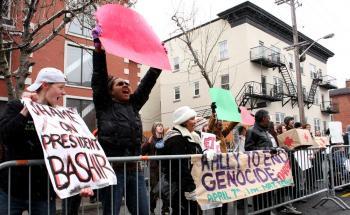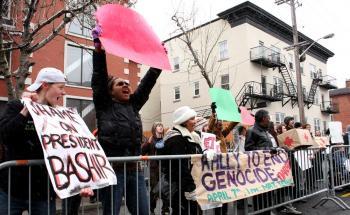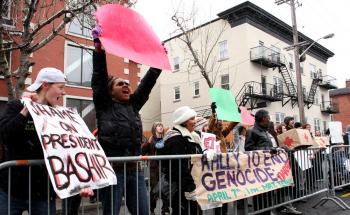OTTAWA—Canada must take stronger action to help end the genocide and deteriorating humanitarian crisis in war-torn Darfur in western Sudan, said activists who held an awareness-raising rally last week.
Students from University of Ottawa (UO) and Carleton University were joined by Sudanese-Canadians and other supporters at a rally on the UO campus, followed by a march to the Embassy of Sudan.
“In the last month [the crisis in Darfur] has gotten a lot worse,” said Jonathan Laski, a UO student and former communications director of STAND Canada (Students Taking Action Now: Darfur).
First there was good news, Mr. Laski said. On March 4 the International Criminal Court (ICC) issued an arrest warrant for Sudanese President Omar Hassan al-Bashir, indicting him for war crimes and crimes against humanity—including murder, rape, and torture—committed in Darfur since 2003.
The 65-year-old leader of African’s largest country became the first sitting head of state ever indicted by the ICC.
But because Sudan does not recognize the ICC, Mr. Bashir retaliated by expelling over a dozen of the most experienced international aid agencies from the country.
These humanitarian NGOs had been providing food, water, medicine, healthcare, shelter, and other lifesaving assistance to the many internally displaced people (IDP) in Darfur and other parts of Sudan.
Among the groups were Oxfam, CARE, Save the Children, and Doctors Without Borders/Médecins Sans Frontières (MSF), which received the Nobel Peace Prize in 1999.
“They know how to operate in such a large area with so many people. The number of people the Canadian government and the international community are saying are affected by those 13 groups is 1.1 million people,” said Mr. Laski.
Students Urge Stronger Action to End Darfur Genocide
Canada must take stronger action to help end the genocide and deteriorating humanitarian crisis in war-torn Darfur in western Sudan, said activists who held an awareness-raising rally last week.

STOP DARFUR GENOCIDE: Students and Sudanese activists rally in front of the Sudanese embassy in Ottawa on April 7 to demand the return of aid groups to Darfur to continue providing lifesaving support to 1.1 million people. Samira Bouaou/The Epoch Times
|Updated:





